Welcome to WordPress. This is your first post. Edit or delete it, then start blogging!
Wellington event: 2011 Year of the Protester
Spark interview: Sue Bradford on the unemployed workers' movement
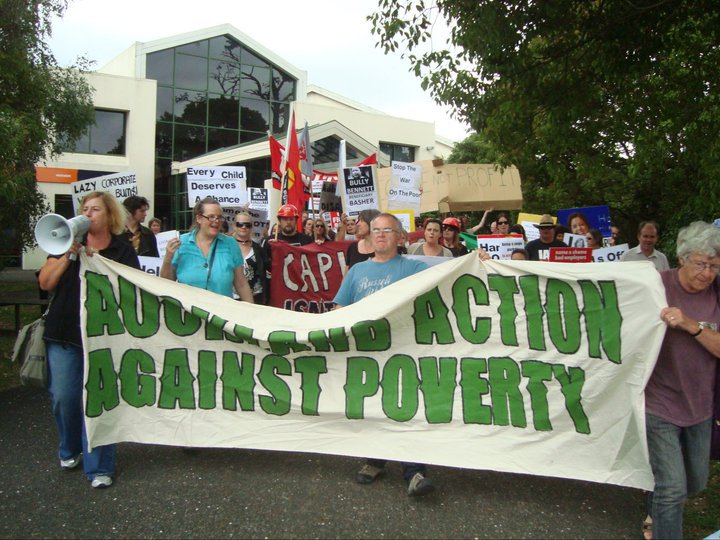 Over the weekend Auckland Action Against Poverty held a workshop to devise their next campaign. During the break Spark writer Ian Anderson sat down with Sue Bradford to discuss the history and future of the unemployed workers’ movement.
Over the weekend Auckland Action Against Poverty held a workshop to devise their next campaign. During the break Spark writer Ian Anderson sat down with Sue Bradford to discuss the history and future of the unemployed workers’ movement.
Spark: How will National’s recently announced welfare reforms affect beneficiaries?
SB: For youths of 16-17 years old it will mean the state, or private service providers, managing their income. My fear with this is that it will be extended to more beneficiaries, as the Welfare Working Group recommended.
For solo mothers it will mean work testing and harassment. In July they’ll be announcing reforms targeting people on the Sickness Benefit.
Spark: Why must all workers oppose these attacks?
SB: The worse it is for beneficiaries and the unemployed, the more competition for low paid jobs, the easier it is to drive down wages and conditions.
The capitalist system needs unemployment. Lately people have been very open about this, saying a certain amount of unemployment is good for economic growth. Continue reading “Spark interview: Sue Bradford on the unemployed workers' movement”
Auckland wharfies remain staunch
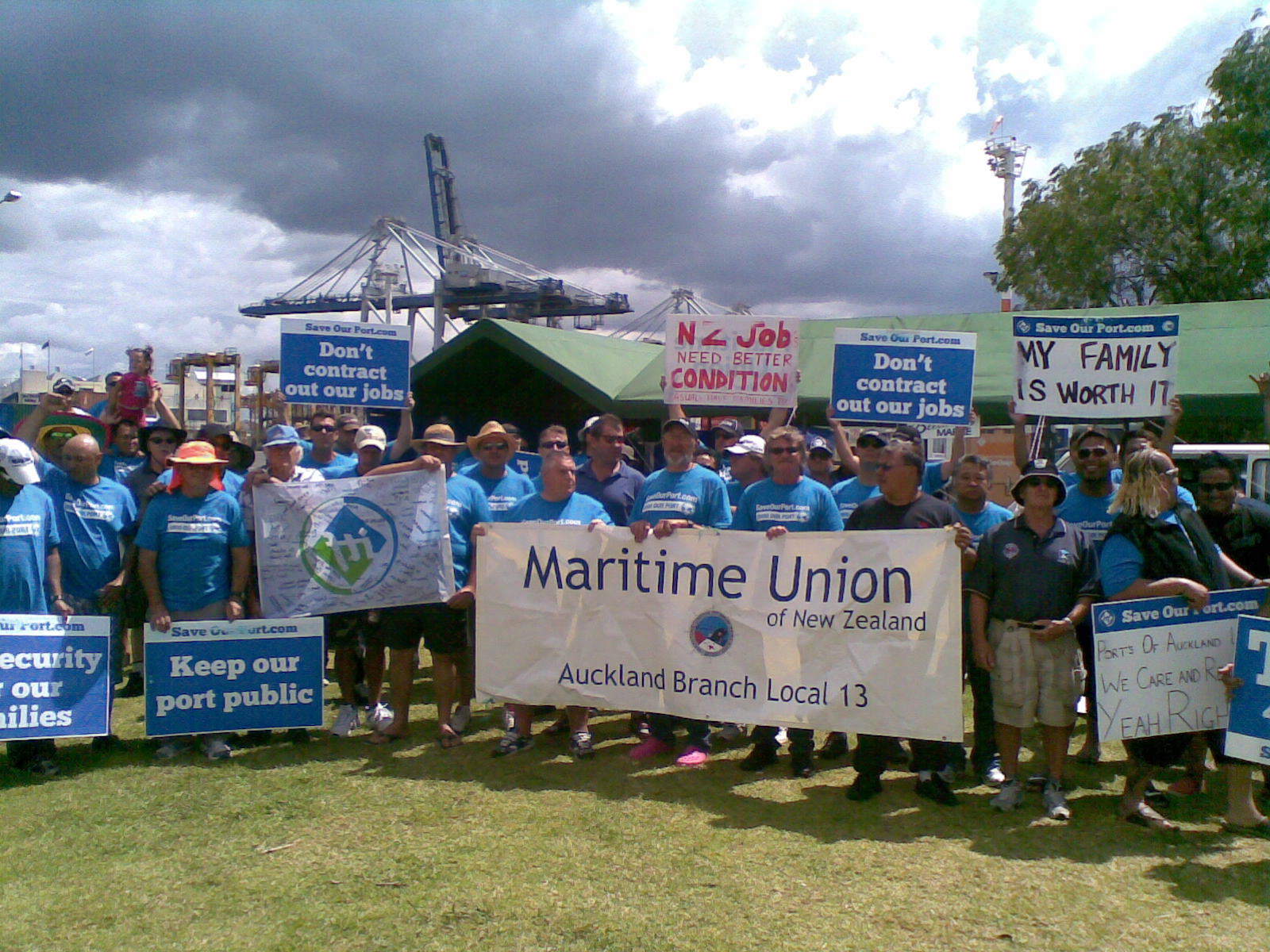 The mood on the picket line at the Ports of Auckland remains staunch and upbeat after the first week of a four week strike. Several of other unions were flying their flags in solidarity, and a steady stream of toots in support flowed from the passing cars, trucks and trains.
The mood on the picket line at the Ports of Auckland remains staunch and upbeat after the first week of a four week strike. Several of other unions were flying their flags in solidarity, and a steady stream of toots in support flowed from the passing cars, trucks and trains.
A number of wharfies I met described their disappointment and anger at the lack of backing they have received from Labour-aligned Auckland mayor Len Brown. The dispute has inevitably taken on a political dimension, as plans to eventually privatise the port become more evident.
The workers pride themselves on the shipshape safety culture they have established over the years on the Auckland wharf. But management continually try to push the envelope: “Young workers are being pressurised to drive the straddle cranes round like stock cars.”
Over the last two days, the workers on the picket line witnessed two ships in port being unloaded by scab labour. Although the sight was a somewhat demoralising, the universal comment from the guys was: “just wait till that ship gets to Melbourne.” A great source of strength for the wharfies is knowing that the International Transport Workers’ Federation has got their back.
This week has seen hundreds of AFFCO meat workers locked out, and their remaining union workmates walking out in solidarity, as well as Oceania aged care workers taking strike action. Most workers instinctively recognise that the Wharfies are currently on the front line of the class struggle in Aotearoa. More power to them!
Fairfax opinion piece: Media profit from bigotry
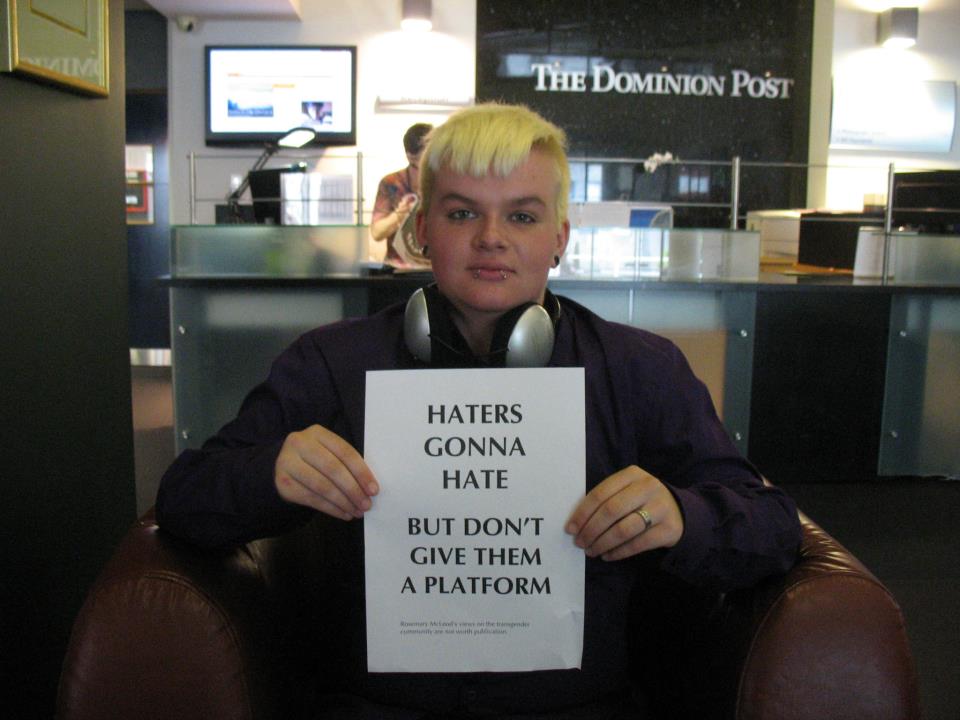
As a result of Friday’s action against media transphobia, members of the Queer Avengers (and friends) were offered an editorial to counter Rosemary McLeod’s. This piece was co-written by Ian Anderson and Rosie-Jimson Healey.
EGO-TRIP: compound noun, informal. An activity done in order to increase one’s sense of self-importance.
One would think that giving birth is an activity unlikely to be deposited scathingly in the ego-trip category.
Perhaps bringing a new life into the world does increase one’s sense of self-importance; it is an astonishing example of the power of the human body when a perfect tiny human emerges from a uterus that has casually grown to 500 times its usual size.
Not to mention the presentation of a helpless, beetroot-coloured miniature human being. Even so, we don’t imagine many would link the term “ego-trip” to this particular moment in most parents lives.
However, this was the case in Rosemary McLeod’s piece that bore the headline Why I feel sorry for the children of ego-trippers (February 23). An innocent enough title, certainly not one that would sound immediate alarm bells in the reproductive rights, hate speech and eugenics departments. Continue reading “Fairfax opinion piece: Media profit from bigotry”
Capitalist universities and fightback
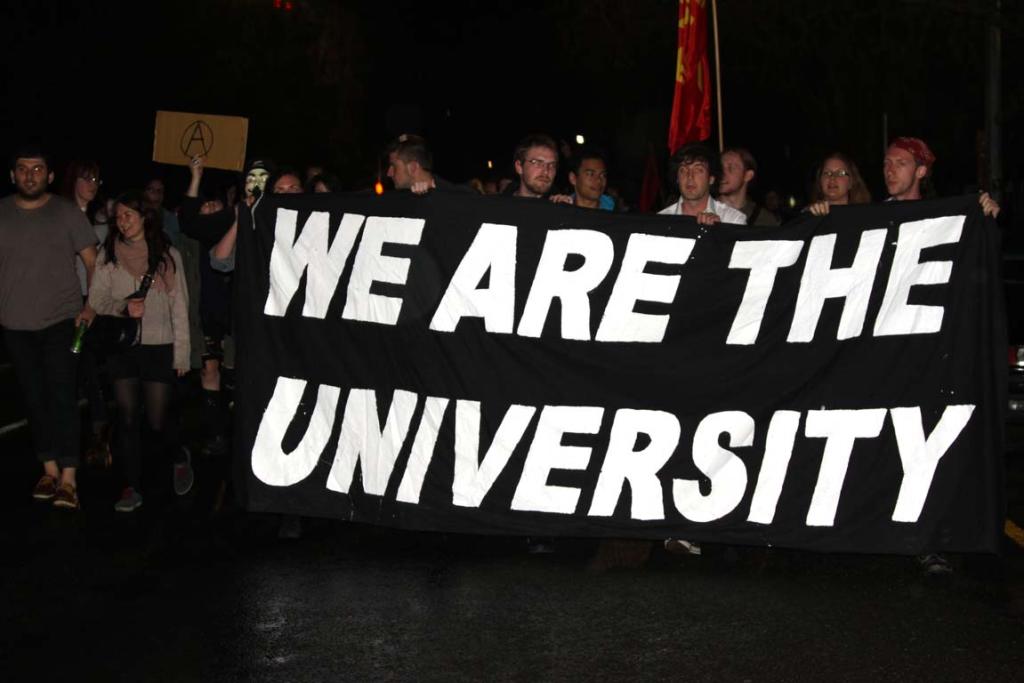 Joel Cosgrove
Joel Cosgrove
Universities are an important part of modern society. The Education Act of 1989 defines them as being the “critic and conscience of society”. In practice the record has been patchy at best. Students (and staff) have historically joined in repressive actions against striking wharfies in 1913, deputised and moblised to put down peaceful marches by unemployed workers during the depression.
In the documentary 1951 author Kevin Ireland recalls calling a Student Representative Council meeting to make a stand against the draconian laws passed to smash the locked out watersiders in 1951 and finding his progressive motions drowned out 10-1 by conservative students, bent on supporting the authoritarian actions of the state. Future Prime Minister and editor of the Victoria University student newspaper Salient described the (relative) progressive freedoms in place for women at the university in the mid-60’s as corrupting, stating that “If she does this [get involved in politics] she will never become a lady” as well as becoming losing their apparent “femininity”. Michael Laws first came to prominence at Otago University as a leading supporter of the Springbok Tour, with surveys at both Otago and Victoria Universities indicating a rough 50/50 split in opinion for and against the tour. Even during the ‘golden years’ (roughly the 1960’s-80’s) the role of the university was to pump out industry friendly graduates. Every freedom gained, was gained through struggle. Some of the early protests in the 60’s at Victoria University were over the right for students to have the ability to live in mixed gendered flats. Continue reading “Capitalist universities and fightback”
Fairfax Report: Trans-gender community protest against column
[youtube=http://www.youtube.com/watch?v=x3NN6tlkesE]
About 50 protesters from Wellington’s Queer Avengers lobby group picketed the offices of The Dominion Post at lunchtime levelling charges of transphobia at the paper, its parent company Fairfax and the wider media.
The controversy arose yesterday when veteran Dominion Post columnist Rosemary McLeod published an opinion piece entitled Why I feel for the kids of ego trippers.
The column dealt with the issue of transgender parent Thomas Beatie who has given birth and appeared on television shows and in numerous media reports as a result.
Protester Sara Fraser said McLeod’s column was “appalling” and was part of a transphobic trend in the New Zealand media.
“She claimed not to know anything about the topic but still wrote about it.”
Ms Fraser said of particular concern was the use of the split pronoun he/she that McLeod used to refer to Beatie.
She said the over-riding issue was the column made transgender people look like unfit parents.
“Rosemary needs to wake up and smell the 21st century – such hatred is not acceptable in this day and age.”
Skye Shaddix, a 17-year-old female-to-male transgender person, said there was no reason why “trans-people should not be allowed to have kids.”
Shaddix and his 19-year-old boyfriend – also female-to-male transgender – were considering having children in their late 20s.
“We should not be judged on how we were born – we have the working body parts, so why can’t we have the kids?”
The protesters gathered outside The Dominion Post‘s Boulcott St offices in downtown Wellington carrying placards bearing slogans like “transphobia is bullshit” and chanting “hey hey, ho ho transphobia’s got to go” and “we’re here, we’re queer, we’re fabulous, don’t f#$k with us.”
Speakers at the protest said the media was profiting from racism, bigotry, homophobia and transphobia.
Queer Avengers’ Brooklyne Kennedy called McLeod’s column the “asinine rhetoric of the past” to cheers from the other protesters.
The group proposed a one day boycott of Fairfax’s Stuff website before going into the ground floor lobby of The Dominion Post to deliver a letter to management.
Dominion Post editor Bernadette Courtney said the column was carried on dompost.co.nz, and in print, in sections clearly identified as opinion or comment.
“The piece represents Ms McLeod’s opinion and, while I accept that not everyone would agree with it, and may even have been affronted by it, I believe that when balanced against the principle of free expression, it would have been going a step too far to have banned it,” Ms Courtney said. [ed note: private newspapers select what to print and what not to print.]
– © Fairfax NZ News
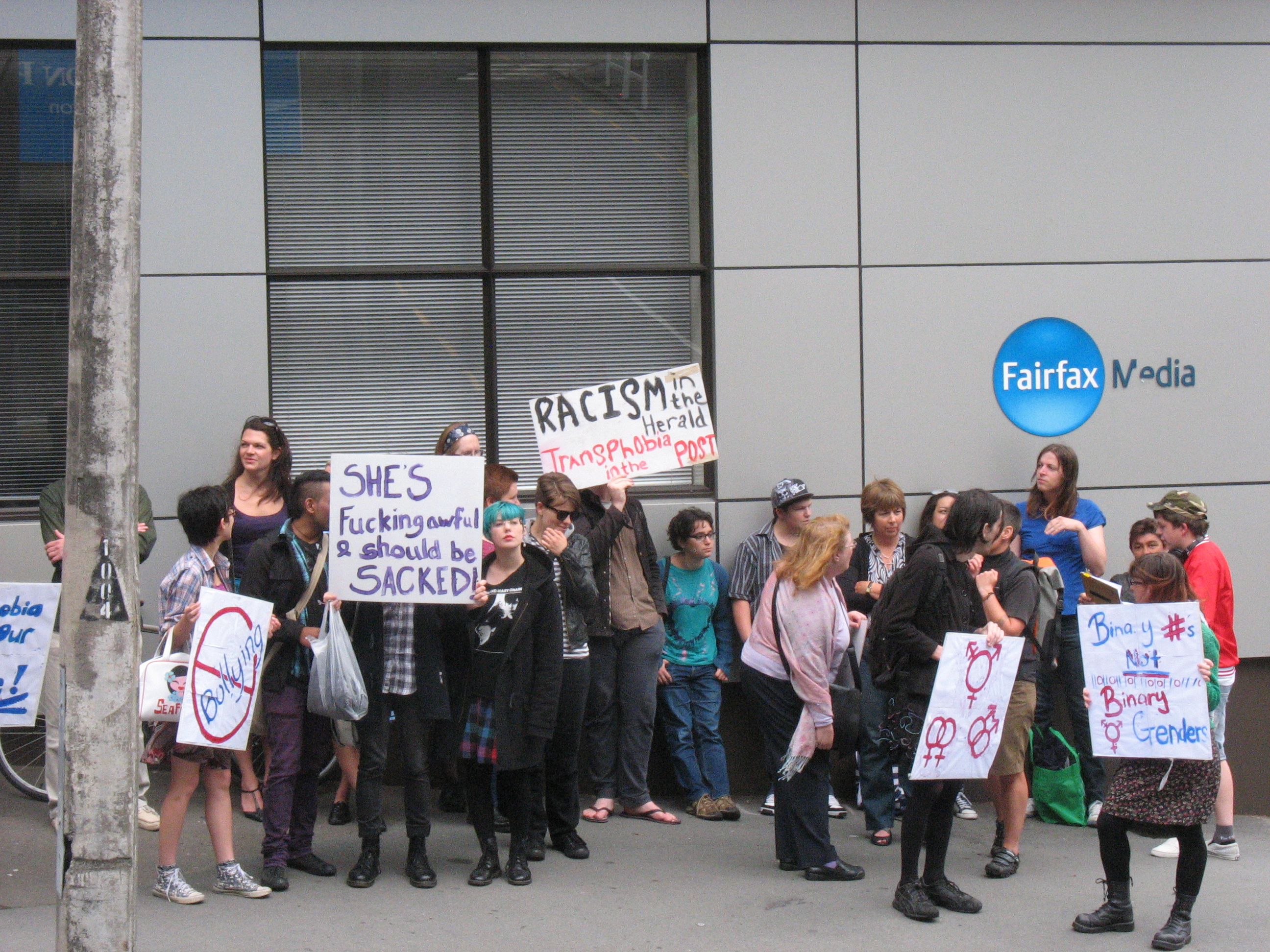
Drugs in Organised Sport
“Blood doping is a logical outcome of a sport where people push themselves to death for the enjoyment of fans and benefit of sponsors. Of the seventy top ten finishers in Armstrong’s seven Tour De France victories, forty-one have tested positive for PEDS. [Preformance Enhancing Drugs]”[1]
Joel Cosgrove

Within any discussion of modern day sport, the question of drugs comes up repeatedly. It is difficult to really get beyond the initial discussion: for, against, or on-the-fence, in regards to either the problem or the solution.
The reality is that since ancient times, strategies and theories have been developed in order to get an edge. While using magic mushrooms or whisky as performance enhancing aids might seem comical to the modern reader, they form part of a process that has led to academic Tony Schirato to describe as “…replacing this [pre-modern sport with] a level of professionalism, specialization, bureaucratization, and secularism never before seen in sport”.[2]Like every other part of human existence, capitalism has fundamentally changed the way we see organised sport.
Continue reading “Drugs in Organised Sport”
Queer Avengers protest media transphobia
 Members of the Queer Avengers, a queer and trans activist group, have called a protest against a transphobic article by Rosemary McLeod. The rally is taking place at 12:30 Friday 23rd February, outside the headquarters of Fairfax Media, who own the Dominion Post.
Members of the Queer Avengers, a queer and trans activist group, have called a protest against a transphobic article by Rosemary McLeod. The rally is taking place at 12:30 Friday 23rd February, outside the headquarters of Fairfax Media, who own the Dominion Post.
McLeod’s article states that transmen are in fact women, repeatedly using the pronoun “he/she.” Outrage has erupted online, on Twitter and elsewhere. The Queer Avengers event is circulating widely on Facebook, with over 100 down to attend in the space of an hour.
While a Dominion Post spokesperson says the article was merely Rosemary McLeod’s ‘opinion,’ protesters point out that the Dominion Post provide a platform for such opinions.
“They’re just profiting off bigotry,” says Queer Avengers activist Emily Haskell. “It happens throughout the media, and we won’t stand for it.”
McLeod asserts that she is worried for the kids of transmen. However the Queer Avengers note that in another article printed on the same day, a US study noted that children who express themselves in ways contrary to their percieved gender are often targeted for abuse, leading to post-traumatic stress disorder. “Transphobia hurts children and parents,” asserts Queer Avengers activist Stephen Jackson.
The Queer Avengers formed out of a ‘Queer the Night’ march with around 300 attendants in 2011. They have called a press conference on Thursday the 15th of March to discuss press coverage of gender variance, following on from the rally at Fairfax headquarters.
The dialectical relationship between work and mental health: part 3
 This article is part three in a series of articles by Polly Peek. The first two parts can be read in the January and February issues of The Spark or online here (part 1) and here (part 2)
This article is part three in a series of articles by Polly Peek. The first two parts can be read in the January and February issues of The Spark or online here (part 1) and here (part 2)
The low employment rates for people experiencing mental ill health can be attributed to a combination of individual discrimination and, more predominantly, systemic barriers. Research into occupational perspectives on recovery by Mary Kelly, Scott Lamont and Scott Brunero, highlighted the experiences of a mental health consumer who was forced to take early retirement by his employers upon disclosure that he was seeing a psychiatrist. This kind of anecdotal evidence may give perspective to the question of whether mental ill health leads to unemployment, or loss of employment erodes resiliency with the suggestion that where illness leads to unemployment, it may, in many cases not result exclusively from symptom recovery but external issues such as inter-personal discrimination.
 I would argue that in these situations individual discrimination is a result of a wider systemic issue that is the bottom-line focus of businesses. This priority is evident in research such as that produced by London School of Economics and Political Science researchers which outlines the 10 billion pound annual loss to businesses as a result of “failure of employees to fulfil their contractual hours” while absent from work sick. Extending on this, the authors cite the increasing presence of mental illness in the global burden of disease as a reason for some people being absent from work up to three times as often as their colleagues. While similar finding have featured in New Zealand research such as that undertaken by Southern Cross, and cited in the NZ Herald in 2009, more attention to the abilities of employers to reduce the impact of mental illness on workplace performance could improve employment opportunities for people with mental illness in the absence of a larger societal change away from prioritising profit. Continue reading “The dialectical relationship between work and mental health: part 3”
I would argue that in these situations individual discrimination is a result of a wider systemic issue that is the bottom-line focus of businesses. This priority is evident in research such as that produced by London School of Economics and Political Science researchers which outlines the 10 billion pound annual loss to businesses as a result of “failure of employees to fulfil their contractual hours” while absent from work sick. Extending on this, the authors cite the increasing presence of mental illness in the global burden of disease as a reason for some people being absent from work up to three times as often as their colleagues. While similar finding have featured in New Zealand research such as that undertaken by Southern Cross, and cited in the NZ Herald in 2009, more attention to the abilities of employers to reduce the impact of mental illness on workplace performance could improve employment opportunities for people with mental illness in the absence of a larger societal change away from prioritising profit. Continue reading “The dialectical relationship between work and mental health: part 3”


